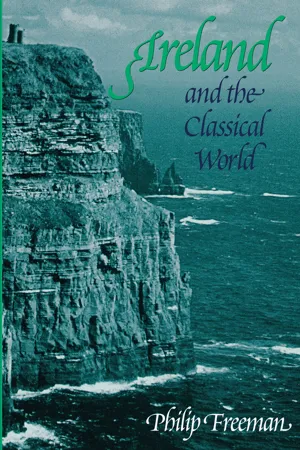
Ireland and the Classical World
Philip Freeman
- 166 Seiten
- English
- ePUB (handyfreundlich)
- Über iOS und Android verfügbar
Ireland and the Classical World
Philip Freeman
Über dieses Buch
"Intriguing... This volume explores the evidence regarding Greek and (mostly) Roman knowledge of Ireland during the classical period." — Bryn Mawr Classical Review On the boundary of what the ancient Greeks and Romans considered the habitable world, Ireland was a land of myth and mystery in classical times. Classical authors frequently portrayed its people as savages—even as cannibals and devotees of incest—and evinced occasional uncertainty as to the island's shape, size, and actual location. Unlike neighboring Britain, Ireland never knew Roman occupation, yet literary and archaeological evidence prove that Iuverna was more than simply terra incognita in classical antiquity. In this book, Philip Freeman explores the relations between ancient Ireland and the classical world through a comprehensive survey of all Greek and Latin literary sources that mention Ireland. He analyzes passages (given in both the original language and English) from over thirty authors, including Julius Caesar, Strabo, Tacitus, Ptolemy, and St. Jerome. To amplify the literary sources, he also briefly reviews the archaeological and linguistic evidence for contact between Ireland and the Mediterranean world. Freeman's analysis of all these sources reveals that Ireland was known to the Greeks and Romans for hundreds of years and that Mediterranean goods and even travelers found their way to Ireland, while the Irish at least occasionally visited, traded, and raided in Roman lands. Everyone interested in ancient Irish history or Classics, whether scholar or enthusiast, will learn much from this pioneering book. "A work of rigorous scholarship based on meticulous research, but the author's prose is as effortless as it is enthusiastic." — American Journal of Archaeology